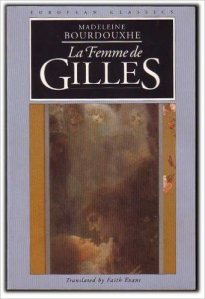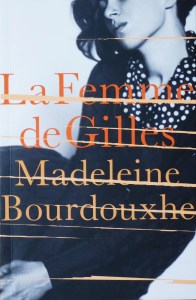
The Belgian writer Madeleine Bourdouxhe’s exquisite first novel, La Femme de Gilles, published in 1937 and translated by Faith Evans in 1992, explores the pain of adultery. It is told mainly from the point of view of Elisa, the faithful wife who is in love with her handsome husband Gilles, a factory worker.
We don’t think of working-class marriages in fiction as erotic. In most working-class novels, marriages are exhausting and unhappy: in D. H. Lawrence’s Sons and Lovers, Paul’s refined mother despises her coal miner husband; in Hariettte Simpson Arnow’s The Dollmaker, Gertie’s factory worker husband squanders her savings; and in Tillie Olsen’s Yonnondio, Jim works in a slaughterhouse and beats his wife and children.
But Elisa, a housewife and mother of twins, is happily married and sexually fulfilled. Bourdouxhe’s sensuous opening paragraph describes Elisa’s intense longing for Gilles as she finishes her housework.
“Five o’clock,” says Elisa to herself. “Soon he’ll be home.” The thought paralyses her completely. She’s spent the whole day polishing, washing, scrubbing, making a thick soup for supper–most people round here don’t eat a proper meal in the evenings but Gilles works at the factory, and only eats an egg sandwich for lunch. Now she finds herself transfixed, unable even to lay the table. Her arms hang helplessly, hopelessly, at her side. Giddy with tenderness, she clings to the metal rail of the stove, stock still, panting for breath.
The present tense of the first chapter is very vivid and effective and captures the last of their happiness. After the first chapter, Bourdouxhe switches cleverly to the more formal past tense.
Elisa doesn’t suspect Gilles would ever commit adultery. Yet even in the first paragraph she is clinging to a stove’s metal rail, no doubt the product of a factory. It certainly foreshadows her misery. Soon all she will have is the stove.
Bourdouxhe switches to Gilles’ point of view to convey his first flash of attraction for Elisa’s younger sister, Victorine. It takes a while for Elisa to realize he is having an affair. She follows Gilles at night to see where he goes. Heavily pregnant with their third child, she tramps through the snow wearing pattens and eventually loses him.
 Then one day she realizes his girlfriend is Victorine. Elisa is crushed but determined to stay level-headed. She pretends she doesn’t know; then she becomes his confidant. And she is hurt very much.
Then one day she realizes his girlfriend is Victorine. Elisa is crushed but determined to stay level-headed. She pretends she doesn’t know; then she becomes his confidant. And she is hurt very much.
Elisa is a working-class Anna Karenina, only her Vronksy is her husband. This is a stunning minimalist novel, graceful and pitch-perfect.
And in the Afterword, Faith Evans quotes her own conversations in the 1980s with the author and includes the following statement Bourdouxhe wrote for a French edition.
If you watch Elisa from the outside, her struggle is barely perceptible. What I wanted to do was follow Elisa through her interior life. I created her from a composite of the women around me. I’d see a fleeting look, an expression, a smile, for just a moment–then it would be gone… but it emanated from something that continued to live inside them, and it was the look that created the women they were.
What a dazzling book!

Great review Kat! I’ve been toying with the idea of reading this author for a while – now you’ve convinced me!
LikeLike
I discovered her work by accident but noticed while looking for images for the blog that Daunt Books has an edition, too!
LikeLiked by 1 person
Wonderful review I really want to read this now.
LikeLike
It’s excellent!:)
LikeLike
I bought it today. I blame you. 😁
LikeLike
Hee hee!
LikeLike
There’s a certain subset of French and Italian novels by women who present just this sort of milieu and woman in it. Sensual and domestically satisfying life and then we learn he’s sexually unfaithful and exploits her to the hilt. You first see them around the turn of the 19th into 20th century. One practitioner who comes to mind whose novels I’ve liked a lot is Natalie Ginzburg. Elena Ferrante is not so original as critics make out; the truth is that her quartet is a turn away from her strength and this subset of books to mainstream paradigms. She also goes into the relationship of the woman with daughters.
The anglo- tradition shows women breaking out, deeply dissatisfied from the get-go, much much more ironic.
LikeLike
Oh, I must read Natalie Ginzburg! Yes, European novels always have a slightly different bent from American and English. Perhaps Ferrante is a bit like Hilary Mantel: wrote stunning women’s novels and then hit upon something (very good, of course, and in Ferrante’s case still about women) that appeals more to the crowd. I do wonder what Ferrante will write next!
LikeLike